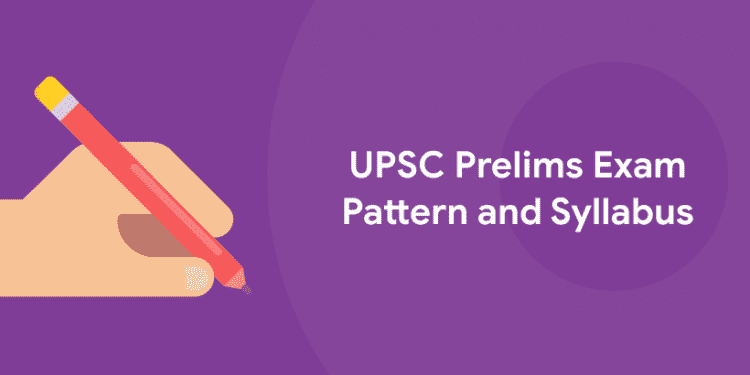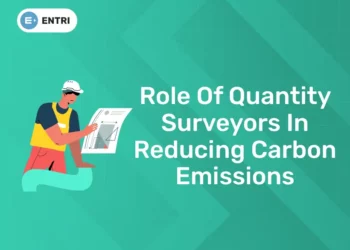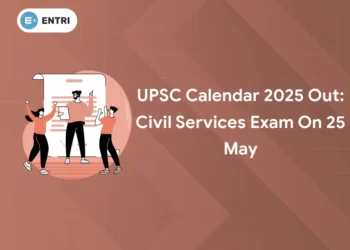Table of Contents
The Union Public Service Commission(UPSC) conducts the Civil Services Examination every year for recruitment to various prestigious positions in the Government of India. This article aims to give the reader an overview of the UPSC exam pattern and syllabus for CSE 2020.In this blog we will discuss about UPSC Exam Pattern and Syllabus.
The UPSC Civil Services Examination, commonly known as the IAS exam due to the high visibility and popularity of the Indian Administrative Service as a career option, is considered to be the toughest examination in India. It has earned this moniker partly due to the intense competition and partly due to the vast UPSC Syllabus. Apart from that, the exam pattern for UPSC CSE is quite complicated and a typical examination cycle lasts for almost a year from the preliminary exam till the final results are declared.
Click here to attempt free mock tests to ace your Competitive Exam Preparation
UPSC Exam Pattern 2020
The pattern of UPSC examination is officially divided into two stages called Preliminary and Main Examination while in practice, it is a three-stage exam.
As per the IAS exam pattern, candidates who clear the Prelims are eligible for Mains and candidates who clear the Main reach the interview stage.
The three stages of the IAS exam are Prelims, Mains and Personality Test.
UPSC Exam Pattern: Prelims
The Prelims Exam date is 31 May 2020. Visit the link to get free study material and preparation strategy for UPSC Prelims 2020.
The UPSC exam pattern for the Preliminary stage consists of two papers, conducted on one day. Both the papers comprise objective type questions with multiple choice of answers. The prelims examination is a qualifying stage to filter candidates for the mains exam. The marks secured at this stage are not counted towards the final merit list, though candidates have to prepare well for this exam as cut-offs are unpredictable and depend on the average score every year. The details of UPSC Prelims Exam are given below:
| Paper | Type | No. of questions | Marks | Duration | Negative marks |
| General Studies I | Objective | 100 | 200 | 2 hours | Yes |
| General Studies II (CSAT) | Objective | 80 | 200 | 2 hours | Yes |
UPSC Exam Pattern: Mains
The UPSC exam pattern for the Mains stage consists of 9 papers conducted over a period of 5-7 days. Only those candidates who secure at least the declared cut off in General Studies I and 33% in General Studies II in Prelims will be allowed to appear for the Mains Examination. As per the exam pattern of UPSC Mains, all of the papers consist of descriptive answer type questions. The details of UPSC Mains Exam are given below:
| Paper | Subject | Duration | Total marks |
| Paper A | Compulsory Indian language | 3 hours | 300 |
| Paper B | English | 3 hours | 300 |
| Paper I | Essay | 3 hours | 250 |
| Paper II | General Studies I | 3 hours | 250 |
| Paper III | General Studies II | 3 hours | 250 |
| Paper IV | General Studies III | 3 hours | 250 |
| Paper V | General Studies IV | 3 hours | 250 |
| Paper VI | Optional I | 3 hours | 250 |
| Paper VII | Optional II | 3 hours | 250 |
All of the mains papers except for the language papers A and B are of a merit ranking nature. Paper A and B are of qualifying nature and candidates must score at least 25% in each for the marks from their Paper I – Paper VII to be given weightage. Paper A is not compulsory for candidates from the States of Arunachal Pradesh, Manipur, Meghalaya, Mizoram, Nagaland and Sikkim as well as candidates with hearing impairment provided they can prove that they have been exempted from such 2nd or 3rd language courses by their concerned board or university. The Indian Language paper covers any of the languages included in the 8th Schedule of the constitution.
The subjects which are covered by the General Studies Papers in Mains Exam are:
| General Studies I | General Studies II | General Studies III | General Studies IV |
| Indian Heritage and Culture | Governance | Technology | Ethics |
| History and Geography of the World | Constitution | Economic Development | Integrity |
| Society | Polity | Bio-diversity | Aptitude |
| Social Justice | Environment | ||
| International relations | Security and Disaster Management |
The Optional subjects for Paper VI and VII of the mains examination have to be any one of the subjects from the following list:
| Agriculture | Animal Husbandry and Veterinary Science | Anthropology | Botany | Chemistry |
| Civil Engineering | Commerce and Accountancy | Economics | Electrical Engineering | Geography |
| Geology | History | Law | Management | Mathematics |
| Mechanical Engineering | Medical Science | Philosophy | Physics | Political Science and International Relations |
| Psychology | Public Administration | Sociology | Statistics | Zoology |
| Literature of any one of the following languages: Assamese, Bengali, Bodo, Dogri, Gujarati, Hindi, Kannada, Kashmiri, Konkani, Maithili, Malayalam, Manipuri, Marathi, Nepali, Odia, Punjabi, Sanskrit, Santhali, Sindhi, Tamil, Telugu, Urdu and English. | ||||
All the papers except the Language papers A and B can be answered in English or any of the languages listed in the 8th Schedule of the Constitution of India. The optional papers can be answered in English even if none of the other papers has been answered by the candidate in English.
Click here to attempt a free mock test to ace your UPSC 2020 Preparations
UPSC Exam Pattern: Interview
This is the final stage of the IAS Exam before the final results are declared. Officially it is called the Interview/Personality Test and counted as a part of the Mains Examination for merit ranking purposes. From a preparation standpoint, it is considered the third stage as preparation strategies for the written and interview stages are different. As per the IAS exam pattern, this consists of an interview by the UPSC board to assess the candidates’ suitability for a civil services career and associated responsibilities. The board consists of competent and unbiased observers who have a record of the candidates’ career. The board would judge the candidates mental and social traits by asking questions of general interest. Some of the qualities that the board looks for are mental alertness, critical powers of assimilation, clear and logical exposition, a balance of judgement, variety and depth of interest, ability for social cohesion and leadership, intellectual and moral integrity.
The maximum marks allotted for the interview stage is 275, thus bringing the total marks for the merit list consideration to 2025.
The whole exam pattern of the UPSC IAS examination is comprehensive and the competition is intense. One should start preparing in-depth as the examination process lasts for almost a year and not making the cut means starting from scratch next year.
UPSC Syllabus 2020
-
General Studies (Prelims Paper I)
- Current events of national and international importance.
- History of India and Indian National Movement.
- Indian and World Geography-Physical, Social, Economic Geography of India and the World.
- Indian Polity and Governance – Constitution, Political System, Panchayati Raj, Public Policy, Rights Issues, etc.
- Economic and Social Development – Sustainable Development, Poverty, Inclusion, Demographics, Social Sector initiatives, etc.
- General issues on Environmental Ecology, Biodiversity and Climate Change – that do not require subject specialisation.
- General Science
-
CSAT (Prelims Paper II)
- Comprehension
- Interpersonal skills including communication skills
- Logical reasoning and analytical ability
- Decision-making and problem solving
- General mental ability
- Basic numeracy (numbers and their relations, orders of magnitude, etc.) (Class X level), Data interpretation (charts, graphs, tables, data sufficiency etc. – Class X level)
UPSC Syllabus: Mains Exam
- The Mains examination constitutes the 2nd phase of the Civil Services Examination. Only after successfully qualifying in the prelims exam would the candidates be allowed to write the IAS Mains.
- The Mains exam tests the candidate’s academic talent in depth and his/her ability to present his/her understanding according to the requirements of the question in a time-bound manner.
- The UPSC Mains exam consists of 9 papers, out of which two are qualifying papers of 300 marks each.
- The two qualifying papers are:
- Any Indian Language
- English Language Paper
The papers on Essay, General Studies and Optional Subject of only such candidates who attain 25% marks in both the language papers as a minimum qualifying standard in these qualifying papers, will be taken cognizance of, for evaluation.
In case a candidate does not qualify in these language papers, then the marks obtained by such candidates will not be considered or counted.
Structure of the language papers:
The types of questions asked are –
- Essay – 100 marks
- Reading comprehension – 60 marks
- Precis Writing – 60 marks
- Translation:
- English to compulsory language (e.g. Hindi) – 20 marks
- Compulsory language to English – 20 marks
- Grammar and basic language usage – 40 marks
The rest of the seven papers can be written in any of the languages mentioned under the Eighth Schedule of the Constitution of India or in English.
The UPSC Mains syllabus gives a list of 48 Optional Subjects which include Literature of different languages
Why Practice from Entri?
- Always provides you up to date materials that are created by Entri’s Top Experts.
- Mock tests available in bilingual and other regional languages
- Download Entri to access the unlimited mock test.
Ace your preparation. That is where Entri comes in. It helps you to prepare effectively for your Exam.
That will be all from our end at Entri, hope you have benefited from our mock tests and study materials. Entri wishes you all the best for your upcoming examinations. Start your Preparation today itself.
Click here to attempt a free mock test to ace your Competitive Exam Preparations











